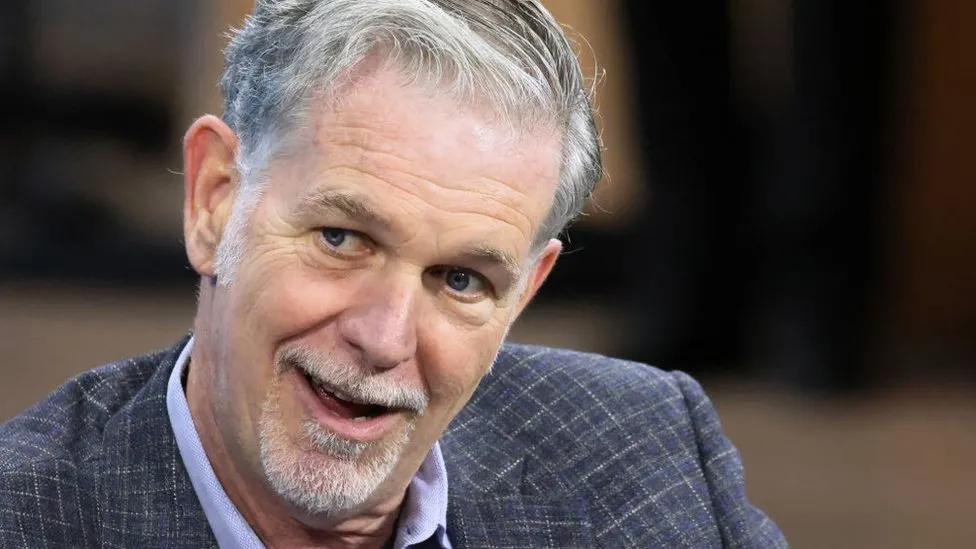Netflix: Reed Hastings steps down but subscribers jump
Reed Hastings is stepping down from his role as co-chief executive of Netflix, the firm he helped found more than 25 years ago.

His announcement came as Netflix unveiled a big rise in subscriber numbers at the end of last year.
With money tight, people were expected to cut back on streaming services.
But Netflix bucked that trend, adding more than seven million new subscribers, far more than analysts expected.
Harry and Meghan's revelations were a big draw, as was new Addams Family spin-off series Wednesday, and the film Glass Onion.
"2022 was a tough year, with a bumpy start but a brighter finish," the company said in a statement.
Mr Hastings' long-planned move means he is leaving Netflix in a crowded market, with challenges ahead, but with 231 million viewers signed up around the globe.
Mr Hastings, who was an early pioneer in the streaming business and is seen as one of the original tech industry disruptors, will stay on as executive chairman.
The firm will now be run by Ted Sarandos and Greg Peters, both already in senior executive positions.
"Reed Hastings stepping down from his current role raises a lot of questions about Netflix's future strategy," said Jamie Lumley, analyst at research firm Third Bridge.
"Incoming Co-CEO Greg Peters will have a number of major decisions on his plate from managing high levels of expenses, password sharing, and cracking the code to find the next Stranger Things."
Mr Peters has been given a strong start, with total subscribers for the last three months of 2022 up 7.66 million, when the firm had predicted a rise of around 4.5 million.
Alicia Reese from Wedbush Securities said there were two reasons Netflix had managed to keep subscribers from cancelling.
"First, viewership trends indicate better retention on popular shows; second, Netflix offering an ad-supported tier to anyone looking to cancel or pause their membership," she said.
Both those factors limited customer "churn" she said.
Revenue rose to $7.9bn (£6.37bn) in the fourth quarter. However, profit was lower in this quarter than the same period a year earlier, and profit for the year as a whole was down from 2021. Although Netflix remained "ahead of its competitors" on profitability, said Ms Reese.
In early 2022, Netflix faced an uphill battle. It was facing increased competition from rivals such as Amazon, HBO, Apple TV and Disney. It cut hundreds of jobs, but still found it had to put up prices to customers to cover rising costs.
That dealt a blow to its subscriber numbers in the first half of the year.
In November, it introduced a cheaper ad-supported option in 12 countries, including most of Europe, the UK and the US, and signalled it would be less tolerant of password sharing in future. Netflix said it was "pleased with the early results" from the service.
Although Netflix did not report how many subscribers signed up to the new ad-supported tier, Mr Peters said they would not have entered the space if they did not think it could be "very successful".
"And they've only started to crack down on password sharing in Latin America," said Simon Gallagher, former director of content acquisition at Netflix. He added that the next six months will decide how sturdy Netflix is, as it rolls out new pricing schemes across the UK and US, and focuses on stopping password sharing in those regions.
"Reed Hastings has been there for 20 years and I think he wanted to go out on top - this has been a successful quarter for them. But he will remain very engaged as executive chairman," added Mr Gallagher.
The company could remain resilient, Mr Gallagher said, even as smaller streaming services continue to merge to compete with bigger services like Netflix.
Netflix shares, which have fallen nearly 38% in the past year, rose in after-hours trading following the results announcement.
Netflix started out in 1997 as a mail-order film service. Customers ordered via the website and DVDs were posted to them at home.
Mr Hastings has sometimes said the idea for Netflix was sparked when he owed a large fine for forgetting to return a video cassette to rental shop Blockbuster and thought a model more like gym membership, with a monthly fee for renting films, would be better.
However, his co-founder Marc Randolph reportedly disputed this version, saying the pair had simply aimed to emulate Amazon.
-bbc






